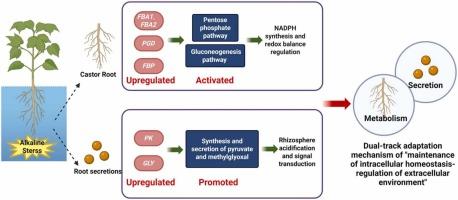碱胁迫下蓖麻根际到细胞内的适应:戊糖磷酸盐和丙酮酸途径介导跨维调节
IF 6.2
1区 农林科学
Q1 AGRICULTURAL ENGINEERING
引用次数: 0
摘要
碱胁迫通过诱导渗透失衡、氧化胁迫和根际ph升高,严重损害作物根系发育和功能。蓖麻是一种具有抗逆性的油料作物,具有显著的耐碱性;然而,潜在的根反应机制在很大程度上仍未被探索。在这项研究中,我们对蓖麻耐碱(ST)和碱敏感(SS)基因型进行了综合多组学分析,包括根转录组学、代谢组学和根分泌物代谢组学,以阐明控制根系对碱胁迫反应的跨维调控网络。我们的研究结果表明,ST基因型通过双重适应策略减轻碱诱导的损伤,包括细胞内和根际反应。具体来说,ST根上调ppp相关基因表达和酶活性,以维持细胞内氧化还原稳态,同时增强丙酮酸的生物合成和渗出途径,分泌酸化根际的有机酸。在ST基因型中,编码果糖-二磷酸醛缩酶(FBA)、6-磷酸葡萄糖酸脱氢酶(PGD)和果糖-1,6-二磷酸酶(FBP)等关键代谢酶的基因显著上调,从而协同增强了PPP和糖异生等抗逆性关键通路的高效运行。此外,丙酮酸和甲基乙二醛在ST根分泌物中显著积累,被认为是调节根际pH和激活胁迫反应的信号分子。本研究首次建立了蓖麻碱胁迫响应的转录-代谢-分泌综合模型,强调了PPP和丙酮酸代谢在协调根际和细胞内适应中的核心作用。这些发现为耐碱油籽作物的选育提供了有价值的见解和分子靶点。本文章由计算机程序翻译,如有差异,请以英文原文为准。

Rhizosphere-to-intracellular adaptation in Ricinus communis roots under alkali stress: Pentose phosphate and pyruvate pathways mediate cross-dimensional regulation
Alkaline stress severely impairs root development and function in crops by inducing osmotic imbalance, oxidative stress, and elevated rhizosphere pH. Ricinus communis, a promising stress-resilient oil crop, exhibits notable alkali tolerance; however, the underlying root response mechanisms remain largely unexplored. In this study, we performed an integrated multi-omics analysis, encompassing root transcriptomics, metabolomics, and root exudate metabolomics, on alkali-tolerant (ST) and alkali-sensitive (SS) Ricinus communis genotypes to elucidate the cross-dimensional regulatory network governing root responses to alkaline stress. Our results revealed that the ST genotype mitigates alkali-induced damage via a dual adaptive strategy that encompasses both intracellular and rhizospheric responses. Specifically, ST roots upregulated PPP-associated gene expression and enzymatic activity to maintain intracellular redox homeostasis, while simultaneously enhancing pyruvate biosynthesis and exudation pathways to secrete organic acids that acidify the rhizosphere. In the ST genotype, genes encoding key metabolic enzymes—including fructose-bisphosphate aldolase (FBA), 6-phosphogluconate dehydrogenase (PGD), and fructose-1,6-bisphosphatase (FBP)—were significantly upregulated, thereby synergistically enhancing the efficient operation of stress-resistant key pathways, namely PPP and gluconeogenesis. Furthermore, pyruvate and methylglyoxal accumulated markedly in ST root exudates, serving as putative signaling molecules that modulate rhizosphere pH and activate stress responses. This study presents the first integrated transcription-metabolism-exudation model for the alkali stress response in Ricinus communis, underscoring the central roles of PPP and pyruvate metabolism in coordinating rhizosphere and intracellular adaptations. These findings offer valuable insights and molecular targets for breeding alkali-tolerant oilseed crops.
求助全文
通过发布文献求助,成功后即可免费获取论文全文。
去求助
来源期刊

Industrial Crops and Products
农林科学-农业工程
CiteScore
9.50
自引率
8.50%
发文量
1518
审稿时长
43 days
期刊介绍:
Industrial Crops and Products is an International Journal publishing academic and industrial research on industrial (defined as non-food/non-feed) crops and products. Papers concern both crop-oriented and bio-based materials from crops-oriented research, and should be of interest to an international audience, hypothesis driven, and where comparisons are made statistics performed.
 求助内容:
求助内容: 应助结果提醒方式:
应助结果提醒方式:


